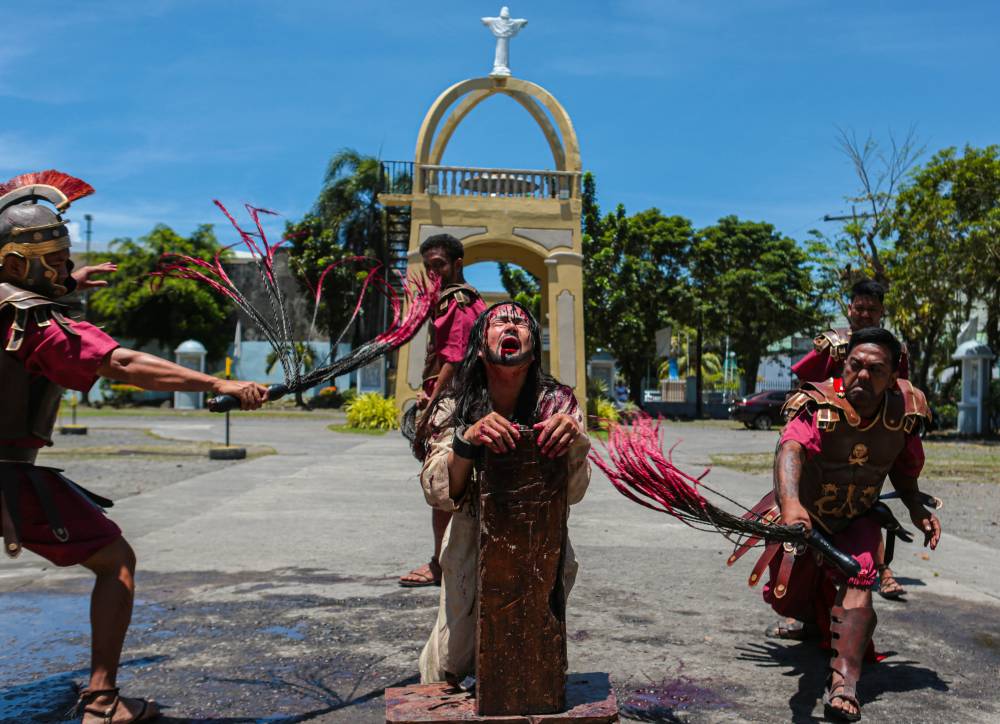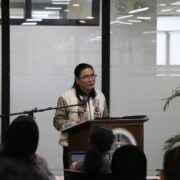CamSur’s Lenten street play transforms lives, strengthens faith

CALABANGA, CAMARINES SUR—The streets in this quiet town in Camarines Sur are transformed into a sacred path during the Holy Week as the Passion of Christ is reenacted in a play where locals assume important roles.
Ramon Paulo Pabico, 27, who has portrayed Jesus Christ for the past three years, felt proud and blessed to play the role each year.
“Every year, it’s different. It’s deeper. It’s not just about acting—it’s about helping people see what God’s love really means,” Pabico said in an interview during their rehearsal on April 9.
He was 13 years old when he first joined the play as a witness. Years later, he was given the lead role, which he credited for the subsequent “miracles” in his family.
“My father survived prostate cancer. My girlfriend, who was once diagnosed with blood cancer, is now healed. I believe those miracles happened through faith,” he said.
This year marks his final portrayal of Christ. “I really prepared for this. In fact, I hit the gym to endure the three-hour, 3.5-kilometer walk [on Good Friday]. I’m praying for healing—for everyone—and for unity in the entire nation,” he said.
Jerome Ordovez, overall chair of the Passion of Christ play, which is acted out using dialogues in Bicolano, stressed that the event is more than just a performance but also a communal act of worship. “We offer everything to God,” he said.
Nelson Formalejo Jr., 34, first joined the Lenten play at just 9 years old. Now an adult, he said portraying Longinus has been life-changing.
“I started as a spectator. Now, it’s a big part of my life. My faith has deepened and I’ve experienced miracles because of it. I can’t imagine letting go. Even when I grow old, I hope to stay—whether as an actor or part of the production,” Formalejo said in a separate interview during the rehearsal.
‘That’s faith’
The street play is staged for three days. The first day is on Holy Thursday, with scenes of Jesus visiting Lazarus and bidding farewell to his mother Mary. The Good Friday staging involves the Passion and Crucifixion of Christ, which runs for three hours. It culminates on Easter Sunday with the Resurrection of Christ. On each of these days, the play winds through the town’s streets, turning public spaces into sacred ground.
Each scene is both a reenactment and a prayer.
From costumes sponsored by local tailoring shops to volunteers who dedicate six months to rehearsals and the performance itself, the play is “all part of our devotion,” said Formalejo.
He estimated that around 30,000 spectators flock to the streets each year to witness the play.
Play director Rosa Ubano-Cid has been guiding the production for 28 of the 30 years since the street play began. The first two years were directed by Rodelio Perez, a founding member of the youth ministry of Parroquia de Nuestra Señora de la Porteria, Calabanga’s parish church.
Urbano-Cid manages a cast of 221 volunteers, which is “not easy,” she said. “We face challenges—especially with time [management]. Everyone has jobs, families. But they still show up. That’s dedication. That’s faith.”
She said the cast was carefully chosen through auditions and interviews. She explained: “You need more than talent—you need heart. Real acting comes when you internalize the message. This isn’t just a play. It’s our way of evangelizing.”
She said the impact of the play kept her going after nearly three decades. “You see people cry, reflect, pray. It inspires them. It changes them.”
‘Panata’
Gary Logoc, 34, who has portrayed various roles over the years and now played a centurion, recalled a time when his blood chemistry became dangerously abnormal.
“I prayed. I promised God I’d serve Him with my life if He healed me,” Gary said. “And He did. Everything went back to normal.”
For many participants, the play becomes a “panata”—a personal vow and a yearly renewal of faith. Elderly spectators like Hermelinda Tangtang, 78, and Lilia Cernal, 72, said they were deeply moved by the realism and emotion displayed in the street play.
Living gospel
“It’s painful to watch what Christ went through but it’s also powerful. It reminds us to seek forgiveness, to reflect,” Tangtang said in a separate interview.
Bernardo Miguel Aguay, who plays King Herod, said the tradition has become part of Calabanga’s identity.
For him, the greatest miracle was witnessing his once-skeptical father come to believe in God and in the afterlife.
According to parish historian Starski Joseph Romero, the play’s reach has gone beyond religion: “Many non-Catholics attend and feel moved. It’s faith made real, not just for us, but for everyone.”
Most of the cast are active members of the Church—lay ministers, lectors and pastoral workers. But on stage, they become vessels of something far greater than themselves, said Romero.
For parish priest Fr. Gilbert Leopoldo Briguela, the play is more than theater. “It’s not just a display or a play—it becomes personal. You express your faith from within. This religious piety is what sustains us and brings people back to the Church.”

















